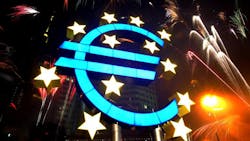Eurozone Business Activity Best Since June 2011
BRUSSELS -- Eurozone private sector business activity in January showed the best performance since June 2011, fresh evidence that a modest recovery is gaining traction, a key survey showed on Wednesday.
Markit Economics said its Eurozone Composite Purchasing Managers Index (PMI) for January rose to 52.9 points from 52.1 in December, the seventh monthly rise in a row.
While this was down from the initial January reading of 53.2, it still represented the fastest rate of growth since June 2011, Markit said.
"The final reading of the eurozone PMI was down slightly on the earlier flash reading but nevertheless signals a very encouraging start to the year," said Chris Williamson, Markit chief economist.
Markit said the upturn was driven by the manufacturing sector while services remained subdued in comparison, at 51.6 points in January compared with 51 in December.
A separate Markit report earlier this week showed eurozone manufacturing hit a 32-month high of 54 points in January, up from 52.7 in December.
On the Composite PMI measure, eurozone powerhouse Germany hit a 31-month high of 55.5 points while Spain was at a 78-month high of 54.8 points.
France, with the second-biggest economy in the 18-nation single currency zone and which has lagged its peers, was on 48.9 points, still in negative territory but improving.
Williamson said the report overall suggested the eurozone economy could grow 0.5% in the first quarter of the year and if that is the case, then 2014 forecasts of 1% are "already looking somewhat conservative."
"While Germany is providing the main impetus to the recovery ... the upturn is becoming broad-based, which in turns adds to the likelihood that it can be sustained," he said.
At the same time, Williamson cautioned that the "recovery is still all-too dependent on the manufacturing sector. "Although the service sector has returned to growth, its weak pace of expansion reflects still-subdued domestic demand ... in many Eurozone countries, notably France and Italy," he said. "A revival in consumer sentiment in these countries will be an important ingredient of a more robust upturn."
Separate figures from the Eurostat statistics agency showed that eurozone retail sales fell 1.6% in December compared with November when they had risen 0.9%.
The eurozone economy finally got out of a record 18-month recession in second quarter 2013 with growth of 0.3% but this then slowed to just 0.1% in the third, sparking fears the recovery was stalling.
Data since then has been mixed but more recently has tended higher, showing the economy has got back on track after hitting a soft spot it hit late last year.
- Bryan McManus, AFP
Copyright Agence France-Presse, 2014
About the Author
Agence France-Presse
Copyright Agence France-Presse, 2002-2025. AFP text, photos, graphics and logos shall not be reproduced, published, broadcast, rewritten for broadcast or publication or redistributed directly or indirectly in any medium. AFP shall not be held liable for any delays, inaccuracies, errors or omissions in any AFP content, or for any actions taken in consequence.
